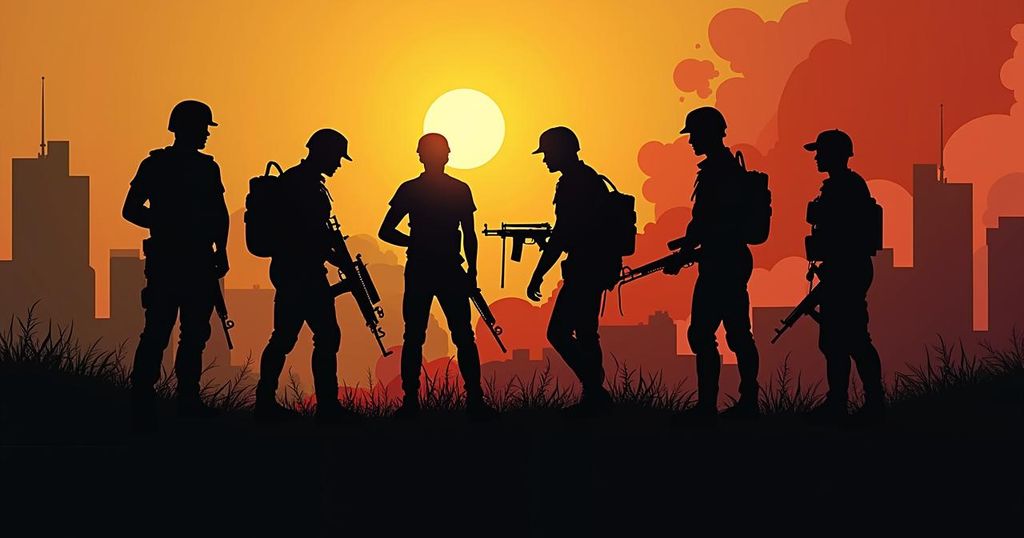In Venezuela, following the disputed presidential election results granting Nicolás Maduro a third term, widespread protests erupted, resulting in numerous arrests and a government crackdown branded as a war on terrorism against critics. Families search desperately for missing loved ones, while tensions mount within a divided society, indicating a significant turning point in Chavismo’s historical support base.
The sweltering heat of the Caribbean sun bore down on those brave enough to gather in Caracas, as relatives of detained protestors formed a line outside the Zone Seven Detention Center in Boleíta. Following the controversial presidential election results that granted Nicolás Maduro a third term, numerous citizens took to the streets in protest, leading to widespread arrests. Among those missing is 19-year-old Luis, who ventured out for the first time to express his dissent. His father, Hernán García, expressed his anguish, searching for answers about his son’s fate nearly 48 hours after his disappearance. This unrest marks a significant shift within the traditionally unwavering support for Chavismo, as residents from impoverished neighborhoods, previously enshrined in the ruling party’s base, now openly challenge the regime’s authority. Under Hugo Chávez, Venezuela experienced an increase in national wealth due to high oil prices, enabling a significant drop in poverty levels through extensive social programs. However, with Chávez’s death and a subsequent decline in oil prices, Nicolás Maduro found himself facing an unprecedented crisis, resulting in widespread emigration and humanitarian struggles for those who remained. In the wake of the election announcement, Caracas transformed into a battleground; armed forces clashed with demonstrators, leading to fatalities and mass imprisonments. The government branded all detainees as terrorists, asserting they were guilty of attempting a coup against his administration, with many facing potential sentences of up to thirty years, including hard labor. Reports emerged detailing the systematic crackdown on dissent, leaving fear in its wake as no further protests materialized. After a subsequent call for demonstration by opposition leader Maria Corina Machado, the participants mainly consisted of middle-class individuals, starkly contrasting with the lower-income protestors previously subjected to detention. The situation exposes the vast divides within Venezuelan society and signifies a turning point in the population’s sentiment towards the Chavista regime, which had maintained loyalty among the poorer sectors for over two decades. Hernán García’s desperate search for his son mirrors a broader societal despair as Venezuela navigates an era of repression and turmoil under Maduro’s leadership. The current political climate remains fraught, with ordinary citizens caught between fear and a longing for justice for their loved ones.
Venezuela, under the leadership of Nicolás Maduro, has faced significant political and economic turmoil following the controversial reelection in July. The election, deemed fraudulent by the opposition and numerous international observers, sparked unprecedented protests, resulting in violent crackdowns by government forces. Maduro’s administration, considering these protests as insurrectionary acts, intensified efforts to suppress dissent, leading to mass arrests and human rights abuses in Venezuela. Amidst a backdrop of deepening poverty and humanitarian crises, the historic loyalty of poorer Venezuelans to the Chavista movement is being challenged, signaling a potential shift in the political landscape. The oppressive environment, marked by extrajudicial actions and widespread fear, continues to unravel societal dynamics forged over decades.
In summary, the recent protests following Nicolás Maduro’s contested reelection have unveiled deep dissatisfaction among the populace, particularly from once-loyal supporters in impoverished neighborhoods. The severe crackdown on dissent has resulted in a climate of fear, with many families, like that of Hernán García, left seeking information on loved ones who have disappeared amidst the repression. The stark divide among those protesting underscores changes in public sentiment that may reshape the political landscape in Venezuela if the current trajectory of oppression persists.
Original Source: www.thestkittsnevisobserver.com







